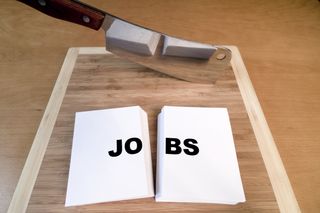Garry Kasparov: AI job losses are ‘the cost of progress’
Chess wizard says humans aren’t being replaced but promoted

Former chess world champion Garry Kasparov has said that any jobs that are lost to the rise of AI and automation are simply collateral damage in the process of civilisation's advancement, arguing that the loss of jobs is outweighed by the societal good that AI can achieve.
Speaking at Tableau Conference Europe, the chess grandmaster equated the looming risk posed by AI to certain roles and professions with the job losses caused by increased factory automation in the 20th century.
"I don't want to sound callous for people who are at risk of losing their jobs to automation, but that's the history of civilisation," he said; "that's the history of progress. We used to lose manufacturing jobs to machines - the only difference now is the people who are at risk have college degrees and Twitter accounts."
Kasparov has first-hand experience of being made redundant by machines, after famously becoming the first world champion to ever be beaten by a computer in a full chess match in 1997. Twenty years later, a different AI accomplished a much greater feat, defeating the world champion of Go, a game which is (mathematically speaking) vastly more complex than chess.
According to Kasparov, AI will force humans to move into different types of roles than the ones they currently occupy. As an example, he highlighted radiology, an area in which AI algorithms are rapidly surpassing their human equivalents in being able to detect anomalies and other potential indicators of cancer.
While this will most likely result in fewer radiology jobs in the future, the end result will be faster, more accurate and more accessible radiology scans for patients, which will lead to improvements in detection times and treatments for patients.
Similarly, he argued that because machines are perfectly suited to performing repetitive, clearly-defined tasks, they will eliminate much of the rote work involved in professional, white-collar roles, allowing humans to engage in more creative tasks.
Get the ITPro. daily newsletter
Receive our latest news, industry updates, featured resources and more. Sign up today to receive our FREE report on AI cyber crime & security - newly updated for 2024.
"According to a McKinsey study from 2016 on the US job market, the median human performance at the workplace required 4% creativity. 4%. There's so much room for us to become human," he said, "to shift some of this rote cognitive work to AI and unleash our creativity."
However, Kasparov argued that the term 'artificial intelligence' is somewhat misleading, suggesting that 'augmented intelligence' may be closer to the truth. He also stated that artificial general intelligence (AGI) - the point at which AI can independently think and reason in a similar way to humans, outside the parameters of a specific function - is still a long way off. "AGI is still science fiction," he said. "It is the fundamental disconnection between machines operating with odds and then moving to something that we call AGI where you need some emotional intelligence."
Fundamentally, he said, AI is neither good nor bad: "It's not a magic wand, but it's also not a Terminator." Instead, he argued that AI is a tool that can be used for both good and ill, but it ultimately has the potential to vastly improve human existence. "We aren't being replaced. We're being promoted."
Adam Shepherd has been a technology journalist since 2015, covering everything from cloud storage and security, to smartphones and servers. Over the course of his career, he’s seen the spread of 5G, the growing ubiquity of wireless devices, and the start of the connected revolution. He’s also been to more trade shows and technology conferences than he cares to count.
Adam is an avid follower of the latest hardware innovations, and he is never happier than when tinkering with complex network configurations, or exploring a new Linux distro. He was also previously a co-host on the ITPro Podcast, where he was often found ranting about his love of strange gadgets, his disdain for Windows Mobile, and everything in between.
You can find Adam tweeting about enterprise technology (or more often bad jokes) @AdamShepherUK.





